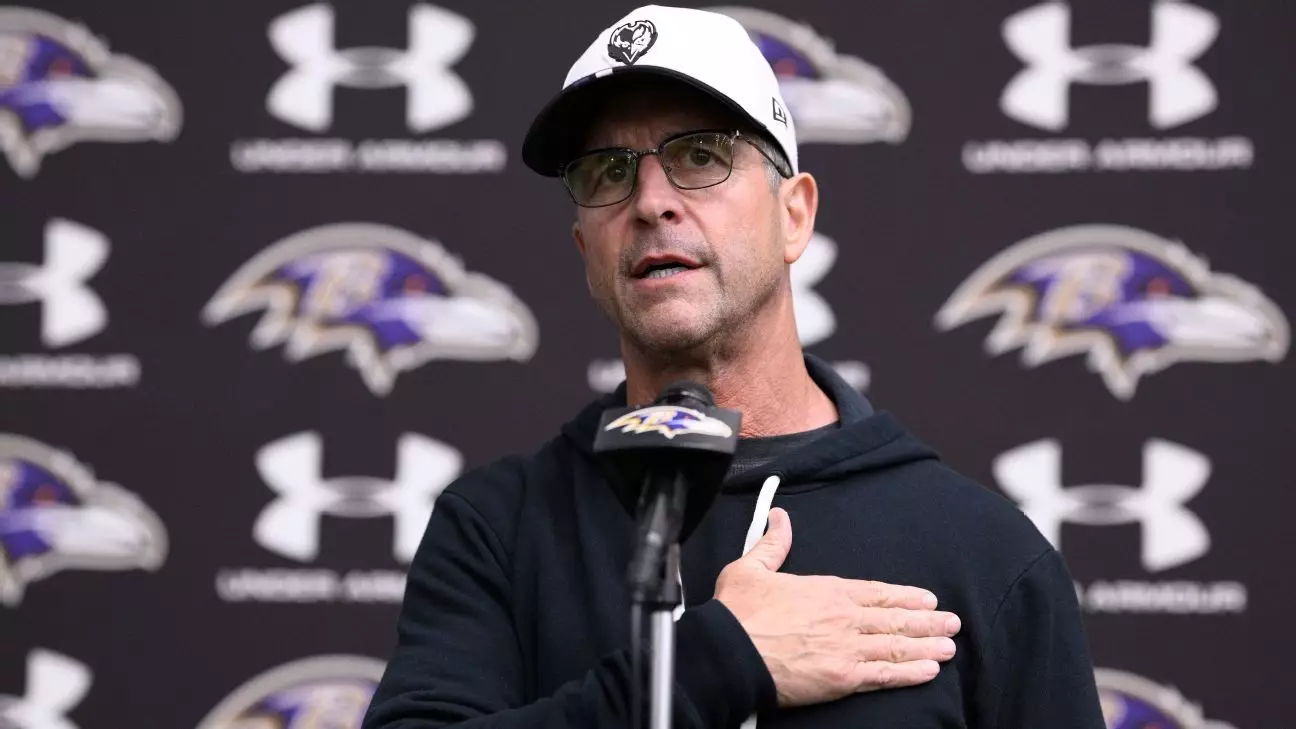In the world of professional football, roster decisions can often reflect a mix of strategy, responsibility, and personal complexities. As the Baltimore Ravens approach an intriguing crossroad at the end of the month, all eyes are on their star kicker Justin Tucker and rookie Tyler Loop, selected in the sixth round of the NFL Draft. Coach John Harbaugh’s recent statements illuminate the intricate nature of managing talent and addressing potential successors, particularly in light of Tucker’s deep-rooted history with the team.
A future with Loop on the practice field alongside Tucker presents a dichotomy. Although Tucker has etched his name into the annals of NFL history as the most accurate kicker ever, recent allegations of inappropriate conduct have cast a shadow on his stellar on-field achievements. Such complications introduce layers of pressure and scrutiny, pushing the Ravens to navigate both performance metrics and public perception as they weigh their options in the coming weeks.
The Underlying Issues of Allegations
The allegations against Tucker, reported by various massage therapists, have raised alarms not just for his career but for the organization at large. Harbaugh’s focus on football-centric decisions seems to suggest that the emotions, while necessary, must take a backseat to pragmatic considerations. “We’ve got to base our decisions on football,” Harbaugh remarked, underscoring the delicate balancing act required when addressing both the statistical aspect of the kicker position and the ethical responsibility that accompanies it.
The Ravens are not merely making decisions behind closed doors; they must contend with public opinion, the NFL’s ongoing investigation, and the implications these aspects entail. With RTucker’s performance diminishing—highlighted by a record of 10 missed kicks last season—the question looms: is it prudent to lean into a promising replacement like Loop, or does the organization retain Tucker in hope of redemption? This dilemma does not merely reside in numbers but resonates deeply within the sport’s moral fabric.
A New Generation of Talent
On the other hand, Loop’s entry into the Ravens organization symbolizes fresh hope and the potential for new beginnings. With commendable stats—6 out of 9 kicks from beyond 50 yards, including a breathtaking 62-yarder—Loop’s credentials speak for themselves. His performance at the combine further solidified his capability, where he posted a striking 93.3% accuracy rate. Following his exploits, Harbaugh described Loop’s kicking technique as “impressive,” indicating a confidence in the rookie’s skill set that could shape the future of the Ravens’ special teams.
Integrating Loop into practice sessions alongside Tucker will create a unique and potentially volatile dynamic. The two kickers starting off on the same field could provide an intriguing case study on mentorship, rivalry, and transition, allowing the Ravens to assess their long-term needs while fostering an environment of talent development.
Navigating Personal Histories
Amidst the drama surrounding Tucker, attention has also shifted to linebacker Mike Green, who has faced allegations of sexual assault in the past. Unlike Tucker’s situation, Green has openly discussed his experiences without evasion, expressing a desire to move forward with his career. He has delicately treaded the line of personal accountability while attempting to refocus energy on football and team integration.
While these discussions of personal history and responsibilities may seem insular, they echo broader themes within the sporting world, revealing how teams increasingly confront off-field behavior. This willingness to address past transgressions signals a shift in the league’s culture, suggesting that performance can no longer overshadow the impact of individual actions. Both Tucker and Green’s stories underline a growing conversation on how athletes can reconcile past behavior with their present identities in a highly public environment.
Implications for Team Culture
As the Ravens continue to navigate these multifaceted challenges, team culture remains central. By balancing talent acquisition with ethical considerations, the Ravens can emerge as a model franchise—leading not just in performance, but in responsibility. This will necessitate an unyielding commitment to fostering an environment that values accountability alongside excellence.
The decisions that lie ahead for the Ravens will undoubtedly create ripples across team dynamics, fan expectations, and the league at large. Whether they choose to believe in Tucker’s redemption arc or invest in Loop’s potential, the broader implications of their decisions resonate loudly: professional sports must confront moral realities alongside the celebration of talent, all while remaining steadfast in their commitment to accountability and community responsibility.


Leave a Reply